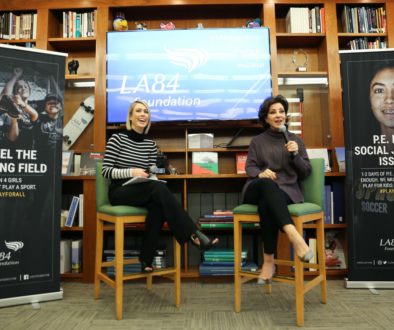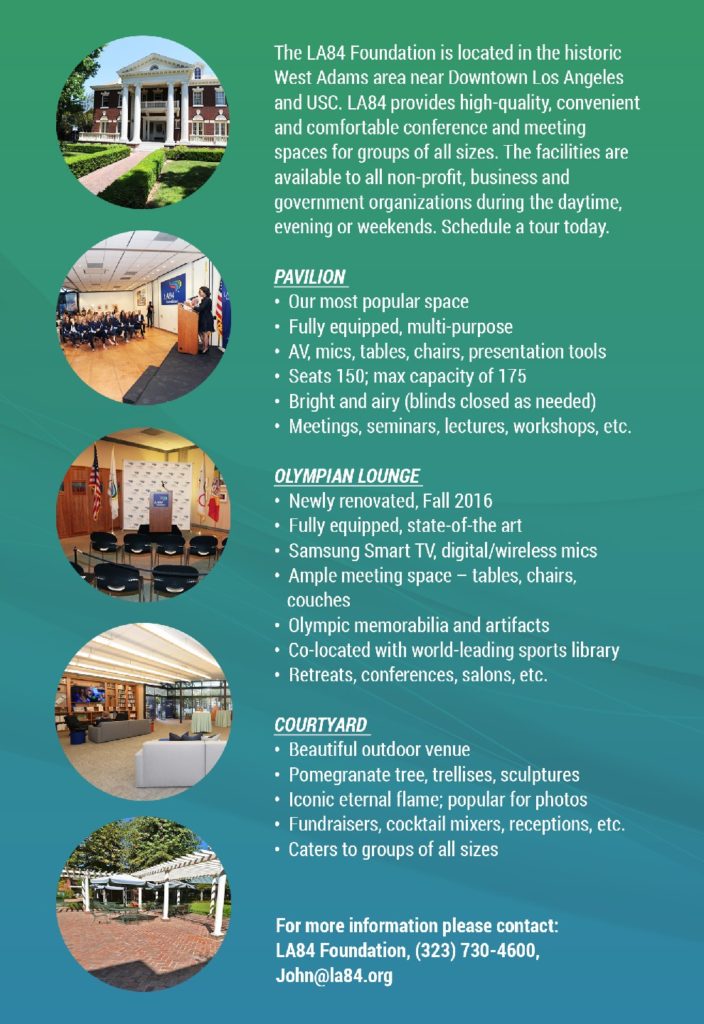SL Interview: Tony Vainuku’s Film on Football in the Polynesian Community
 The sparsely populated islands that make up Polynesia, including American Samoa and Tonga, are small in size. And yet, the list of professional and college football stars of Polynesian descent is outsized: Junior Seau, Troy Polamalu, Marcus Mariota, and many others. According to one estimate, while “Polynesians (Native Hawaiians and other Pacific Islanders) make up only 0.5 percent of the U.S. population (2010 U.S. Census), more than 200 Polynesians have played professionally in the National Football League (and in the Canadian Football League) — 28 times more likely than any other ethnic group.”
The sparsely populated islands that make up Polynesia, including American Samoa and Tonga, are small in size. And yet, the list of professional and college football stars of Polynesian descent is outsized: Junior Seau, Troy Polamalu, Marcus Mariota, and many others. According to one estimate, while “Polynesians (Native Hawaiians and other Pacific Islanders) make up only 0.5 percent of the U.S. population (2010 U.S. Census), more than 200 Polynesians have played professionally in the National Football League (and in the Canadian Football League) — 28 times more likely than any other ethnic group.”
In a sense, Polynesia and football have become the gridiron equivalent of the Dominican Republic and baseball. This connection has provided many positives within the community, including helping families escape from desperate poverty, but also concomitant downsides, including the creation of unreasonable expectations among those youth who seek to pursue a professional career.
In his debut film, director Tony Vainuku examines the so-called “Polynesian Pipeline” phenomenon from a unique perspective. He followed four football players of Polynesian descent while they were attending high school in Utah. The documentary, titled “In Football We Trust,” shows the young men as they navigate the travails of big-time football, both on and off the field. Besieged by high-stakes college recruiters, they face career-threatening injury, family strife, and academic pressure — not to mention the stresses of interracial dating and gang strife.
The movie presents a cautionary tale. On the one hand, the allure of the NFL brand remains incredibly powerful. Not only are successful players seen as heroes and role models within the community, but their multi-million-dollar paydays offer financial windfalls for entire families. However, as Vainuku shows, false expectations have proved damaging to many aspiring players. And, with the recent revelations about Junior Seau’s suicide and Chronic Traumatic Encephalopathy (CTE), it’s also clear that football stardom provides no easy path.
Vainuku is a first-generation Tongan who was born and raised in Salt Lake City. He spent seven years making “In Football We Trust,” which was shown at Sundance last year and recently aired nationally on PBS via the Independent Lens series. (Producer Erika Cohn is the film’s co-director.) In addition, he runs a Salt Lake City-based lifestyle apparel company called SoulPro.
SportsLetter recently spoke to Vainuku by phone from his office in Salt Lake City.
–David Davis
SportsLetter: What attracted you to doing this film about football in the Polynesian community?
Tony Vainuku: I was raised with my cousins, my uncles and all the kids in the neighborhood playing football and doing well at it. We were all big and fast for our age, and when you’re playing Pop Warner, in the early stages of organized football, it was really easy to excel over smaller kids. You get into the high school level and see success immediately. Then, you have guys in the NFL that look like you — you have Junior Seau and Vai Sikahema up there — and you start realizing, “Hey, that’s a realistic goal.”
But the initial inspiration for the film definitely was the story of my younger uncle [Joe Katoa] that hit home for me and made me realize that this isn’t all good. He had all these things going for him. He was an all-state linebacker, he was nationally recruited for college, he was going to be the next Junior Seau. And yet, he ended up going to prison. That is what stuck with me because I was so close to him. He was only two years younger than me. It was hard for everybody in our family to see that happen. That’s when I started looking around and was asking, “Why did this happen to him?”
SL: What do you think happened?
TV: The problem was, he really didn’t know how to do anything else besides play football. He never carried a job. His parents, who were my grandparents, focused on football because he was so good at it. He didn’t do anything else but play football. He almost had the life of a professional athlete as a kid. So, the first thing I thought was, maybe the parents are putting too big of an emphasis on one area, and they’re doing it at the cost of everything else.
As I started digging deeper into that story, you start realizing that it’s more than that. All of his coaches in high school were also his teachers. It’s like this vicious cycle, and they’re using this kid’s talent and forgetting about life outside of that.
I wanted to tell my uncle’s story, but I couldn’t because he was in prison at the time. So, then it became: how do I tell his story? I knew there were other kids going through this because I saw it all the time. My uncle just happened to be the closest one to me.
SL: How did your uncle’s story influence your choice of the four high school football players whose lives you follow in the film?
TV: I knew about the Bloomfield brothers [Leva and Vita] and their dad because my dad’s side of the family is heavily in gangs as well. Everybody knew that their dad was the founder of The Regulators [a Tongan gang]. When I heard that he had two kids that were in their junior and senior years, I thought, maybe I can follow these two kids for a year. But I just didn’t want to rely on the Bloomfields’ story exclusively because then I’m not showing anything different about the [Polynesian-American] culture than what the mainstream media does — which is gangs.
This other kid, Harvey Langi, just happened to be the right age. He had a huge sophomore year and huge junior year and was the golden boy in the area. He was set up to become one of the first Polynesian running backs to be successful in the league. That became an arc in the film as we were following him. He had the kind of talent that my uncle Joe had. Through him I could show that side of the story and the pressure that comes with that in terms of college recruiting and family dynamics.
The fourth was Fihi Kaufusi because we wanted to bring in someone who still spoke the language and connected more to the culture of the Islands. He was able to bring that spiritual side, which most Polynesians, if not all, are very connected with. We’re very spiritual, regardless of what religion we choose to follow. With Fihi, we were able to bring cultural and spiritual aspects into the story.
SL: Were there others that you thought to follow?
TV: We cut two people that were supposed to be in the film. One was Thretton Palamo, who is now on the USA Rugby team and whose family is from Samoa. We started with Matt Asiata — also of Samoan descent — and he’s now with the Minnesota Vikings. But we weren’t able to stay with him.
There were others who we followed that didn’t make it into the final cut for one reason or another. We ended up with over 600 hours of footage that we pulled into a film that was an hour and a half.
SL: How about access? The film showed some disturbing scenes — including Leva Bloomfield getting caught bringing a gun to school — so it looked like you enjoyed good rapport with your subjects.
 TV: Being a Polynesian director, I was able to come to them with the idea of doing this story and gaining their immediate trust. They knew that I wasn’t going to exploit them. They knew that I wasn’t going to create a reality television show. They knew that I had their best interests at heart because it was my story as well. That was huge. There was a lot of respect that way.
TV: Being a Polynesian director, I was able to come to them with the idea of doing this story and gaining their immediate trust. They knew that I wasn’t going to exploit them. They knew that I wasn’t going to create a reality television show. They knew that I had their best interests at heart because it was my story as well. That was huge. There was a lot of respect that way.
Another thing is, because our story has never been on the big screen, they didn’t really know what to expect. To them, a documentary and a narrative film are the same thing. They just trusted me and wanted to support me. They felt that, “Hey, one of our people is doing something other than football, and we want to help him accomplish that.”
Another thing is, they have very real issues, like gangs, that they deal with in their day-to-day lives. The parents knew that this film was something to put out there to help change things. They were in it for the right reasons.
SL: Al Lolotai is considered to be the first professional football player of Polynesian descent, from way back in the 1940s. How and why did football develop into being such an important sport in the Polynesian-American community?
TV: In the Islands, rugby is the number one sport, and it always has been. In America, it wasn’t hard to adapt to football and be good at it because of the size and speed that Polynesians bring to the table. Physical-wise, Polynesians are built for the sport. When I talked to NFL players [of Polynesian descent], they all say that their coaches are always amazed about how fast they are for how big they are. That’s the thing that surprises them the most.
In another sense, Polynesians — at least Samoans and Tongans — are very respect-your-elders and trust-in-your-family oriented. That’s a cultural thing. Football has that same sense of comaraderie. You have a coach that directs you like a father figure, and as a team, you are serving one purpose. It’s your football family. That’s what they often call it.
SL: How has the success of players like Junior Seau and Troy Polamalu in the NFL influenced this trend?
TV: Now we’re hitting on the story of poverty. The community is still mostly first- and second-generation folks looking for that American dream. When parents see this success, like seeing your kids score touchdowns as a child, and then he’s getting awards in high school, that’s instant gratification. It’s easy to say, “Go for the gold,” which is the NFL. For the money side of it, to provide an opportunity to pull the family out of poverty, it becomes a natural way to go. That’s what we showed with Harvey’s story: If your kid is really good at it, it’s natural for the parents to continue to push them.
In the Bloomfields’ position, they’re not necessarily thinking their kids are going to the NFL. They just want them to stay alive. Football becomes a very positive thing versus joining gangs that often pull the youth into drinking and violence.
For Fihi, being more of an orphan in the States, he’s so poor that he’s in a lot harder circumstances than the others. He uses football because he knows he can get into college with it. He knows he’ll never be able to afford college without it.
In the movie, you’re seeing football used in totally different ways in these kids’ lives. All of them can be justified as being better than the alternative.
SL: What sort of pressures does a kid like Harvey, a top prospect, face in high school?
TV: The early media attention alone puts pressure and expectations on him. There’s pressure from everyone — his peers, his family, his coaches — to meet expectations that may not be realistic and would be hard on them if they don’t meet them.
The parents unknowingly put a lot of pressure on him with succeeding for the sake of the family. It’s all in the name of doing something they’re good at because if he can succeed, then the family succeeds. He can put them all on his back. But then it’s like, what are we doing to prepare for the possible reality of him not meeting those expectations?
What I try to tell youth that I speak to about the film is, football can be used as an option as long as it’s not the only option. It can be a positive and healthy vehicle as long as you’re the driver. It can be used to stay out of gangs, to get an education, to provide for your family. But don’t let it use you.
SL: The film showed Fihi getting injured in one game, and yet his coaches and medical staff allowed him to continue to play. That was very troubling to watch. Was it also for you?
TV: No question, there was some negligence there. And, just imagine: that’s high school football. That’s not even dealing with how competitive it gets in college. Those scenes give you a sense of what high school kids are thinking and the kind of soldier mentality they have. You have this coach giving his “Any Given Sunday” speech and telling his kids that they have more to give, and then you have a kid that wants to show his toughness and his dedication and doesn’t want to be seen as a quitter. They ignore the injury as long as the kid can play this game. They’re not thinking about the long-term effects.
If you ask Fihi about his knee today, he wouldn’t blame it on the coach. He’d say, “It was all my fault. I wanted to play. I did that.” It’s that soldier mentality, the be-there-for-your-football-family mentality. What he’s failing to see is, he was just a kid. There were adults around that should have been looking out for his long-term health and making the right decision for him without sacrificing his future.
That mentality is similar to what I’m encountering with my next project, which I’m researching right now. I’m working with the family of Junior Seau and developing a film about him. It’s interesting to me because Junior Seau does not have one recorded concussion. And, obviously, that’s not because he didn’t have them. But it’s because he had this warrior mentality: “My brothers are depending on me on the field, my coach wants me to play, I’m a tough guy and I’m going to do it. I can handle it.” Even though it was a knee injury and not a concussion, what we were able to show in the film is the exact same thing with the mentality of the players.
SL: How long did you follow the young men and how long did it take you to make “In Football We Trust”?
TV: It was a seven-year process, from the initial idea to finding the subjects to doing research on them and spending time with them to actually shooting and then going into post-production. I followed the guys for four years. Financing the film was a little slow, so we ended up having to take a little bit more time than we were expecting. However, that opened us up to more story-lines. We were able to stay with our subjects. We weren’t under any deadlines because we were on our own dollar.
We were fortunate enough to get into Sundance [in 2015], and we were what Robert Redford called “a plugger.” I learned a lot about how to make a film as I was making the film. We started with a few DPs [directors of photography], and then I learned how to work the camera and did a lot of shooting myself, out of necessity for saving some money.
SL: Were there certain films and/or documentaries about youth sports that you studied as models for “In Football We Trust”?
TV: No. You know, when the film first came out, some people said, “Oh, this is ‘Hoop Dreams’ for a different culture.” I knew Hoop Dreams,” but it wasn’t something that I modeled. This film came from real experiences and real issues and real stories that I wanted to tell because I had also lived through it. The references that I ended up turning to once I started putting the movie together were narrative films that gave a voice to the youth. “Alpha Dog” was one. It showed a world where you end up asking all these questions: “Are kids like this? Is this what high school kids are doing in LA?”
Same with “In Football We Trust.” We want people to ask questions about what they’re seeing: “Hold on, these kids are Polynesians and they’re Mormons? What are they all doing in Utah? Do they really go on missions?”
SL: You mentioned earlier that you’re working on a project about Junior Seau. What’s the status of that?
TV: I’ve been working closely with his family the last couple of years on a narrative feature that I’ll write and direct. Obviously, he was a legend and a god to people in San Diego. One of the all-time greats in football history. I want to show how a person that was so godlike eventually becomes human and defeated. For some reason, people don’t take brain injury all that serious because they can’t see it. It’s something that I need more financing to do. It’s a little bit of a slower process.
SL: “In Football We Trust” is now airing on PBS. How did that relationship come about and what are the future plans for distribution for the film?
TV: We were about four years into making the film before we got ITVS [Independent Television Service, which funds programming for public television] to jump on and help us with a development grant. That was awesome because we couldn’t have got the team we needed to do all of our post-production work.
Our slot on PBS will be done in April. After that, the film will go out to SVOD [subscription video on demand]. It won’t do a theatrical run because we’re already too late for that. We weren’t able to qualify for the Oscars and all that.




